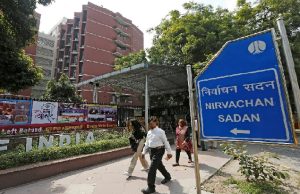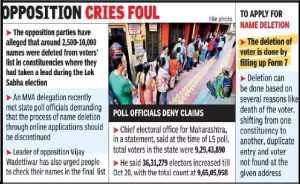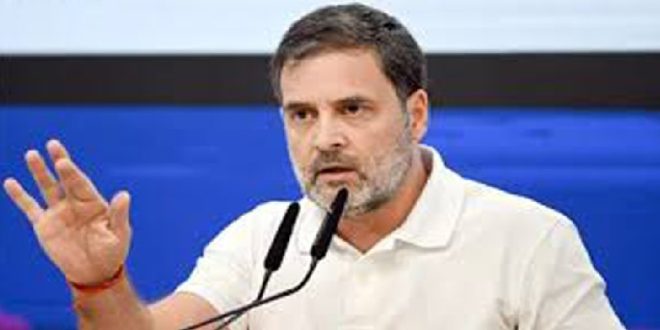10-02-2025
Bureau Report
NEW DELHI/ MUMBAI: India’s top opposition leader questioned the country’s main election body on Friday over what he said were suspect electoral rolls in the richest Indian state.
Rahul Gandhi, the scion of India’s Congress party, Prime Minister Narendra Modi’s main opponent, alleged that more than 3.9 million new names were added to voter lists before local elections last year in Maharashtra state, more than the total number of voters added in the last five years.
 An alliance led by Gandhi’s party lost the election to an alliance led by Modi’s Bharatiya Janata Party, despite being widely projected to win, leading them to repeatedly question the veracity of the poll since the election in November.
An alliance led by Gandhi’s party lost the election to an alliance led by Modi’s Bharatiya Janata Party, despite being widely projected to win, leading them to repeatedly question the veracity of the poll since the election in November.
The Election Commission, which conducts both state and federal elections across the country, has rejected allegations of irregularities and said in a post on X, opens new tab after Gandhi’s allegations that it would respond in writing.
“We have demanded the voter list of Maharashtra, which the election commission has refused to give us. It is their job to bring about transparency,” Gandhi said at a press conference.
He said the next step for the opposition parties would be to go to the judicial system, suggesting the parties might challenge the election in the courts, but did not elaborate.
Meanwhile, Modi’s party has won two key state elections since an underwhelming show in general elections last year and is widely projected to win polls this month for the national capital territory of Delhi, counting for which takes place on Saturday.
Indian Prime Minister Narendra Modi’s BJP party is set to win an election in the Delhi capital territory, TV exit polls projected on Wednesday, in a rebound after its surprisingly poor showing in a general election last year.
Modi’s Hindu nationalist Bharatiya Janata Party was predicted to win an absolute majority in the 70-member assembly of the capital territory, defeating the Aam Aadmi Party (AAP) of Arvind Kejriwal, a fierce critic of Modi.
 Exit polls, conducted by private polling firms for broadcasters, have a patchy record in India, where the voting population is highly diverse.
Exit polls, conducted by private polling firms for broadcasters, have a patchy record in India, where the voting population is highly diverse.
AAP, which grew out of an anti-corruption movement in 2012, tasted its first electoral success in Delhi and has ruled the territory, which houses India’s parliament and federal government offices, for two consecutive terms from 2015.
Kejriwal, 55, an anti-corruption crusader-turned-politician, was arrested on graft charges weeks before the general election began, and alleged a political vendetta by the Modi government. The BJP denies the charges.
He was later released on bail, but resigned as chief minister to focus on campaigning for the Delhi election.
Modi lost his outright majority in the national parliament last year but returned as prime minister for a record-equaling third term with the support of regional parties. His BJP has won two of three state elections since.
India’s election panel has rejected a complaint by Congress, the largest opposition party, regarding vote counting in recent state elections that dashed its expectations, warning that the “frivolous” doubts expressed could provoke turbulence.
The Election Commission dismissed the party’s concerns about the functioning of electronic voting machines as completely unfounded and criticized it for questioning the process.
“Such frivolous and unfounded doubts have the potential of creating turbulence,” it said in a statement on Tuesday.
 Pressmediaofindia
Pressmediaofindia




